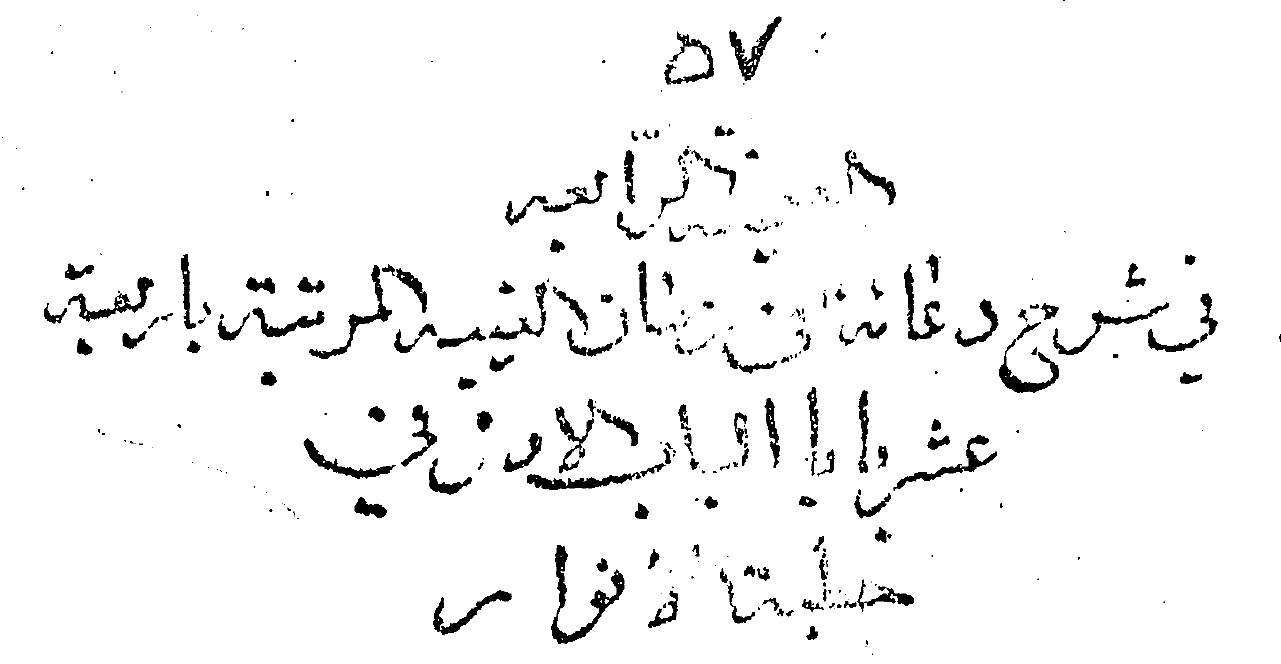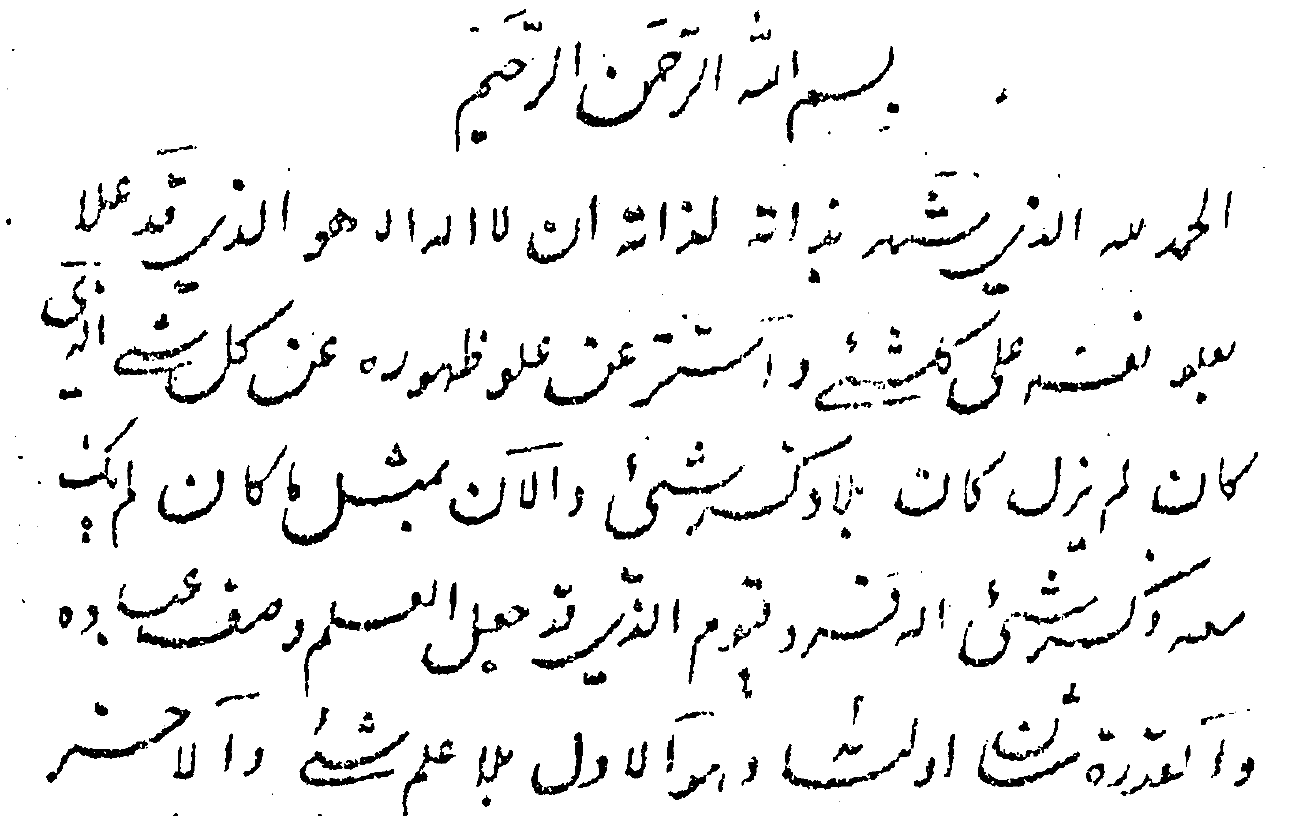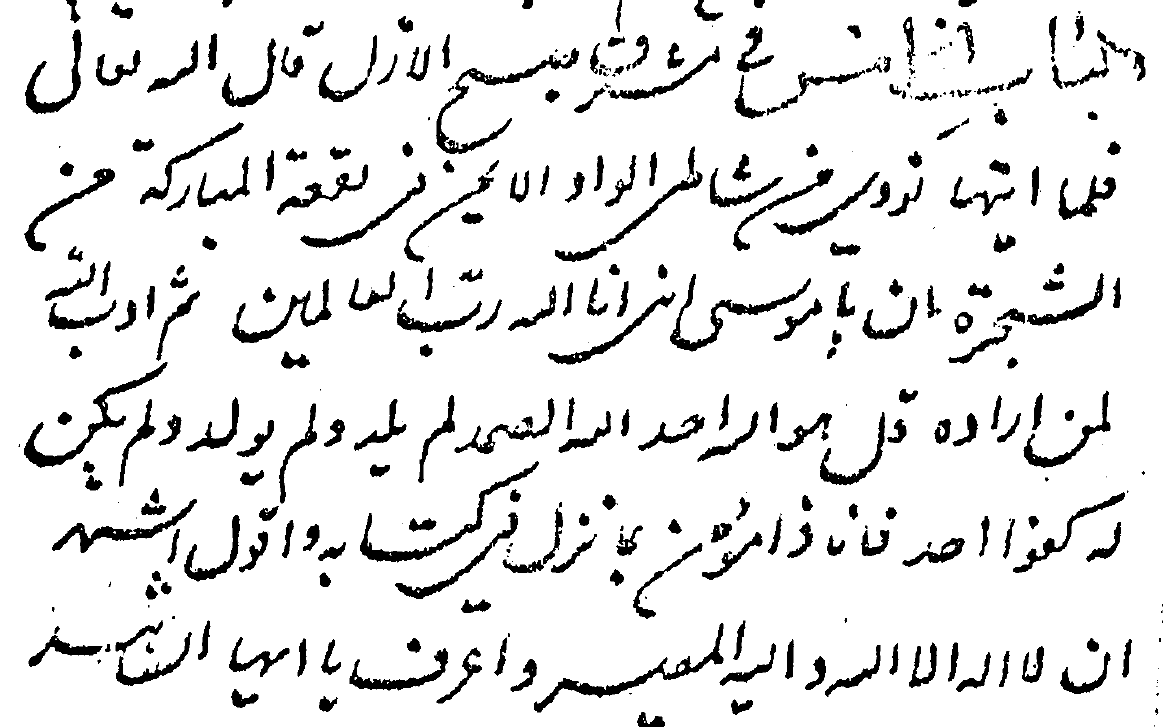
The [Ṣaḥīfa al-Rabi`ah fi] Sharḥ Du`ā’ [ihi] fi Zamān al-Ghayba or the Ṣaḥīfa Ja`fariyya of the Bāb.
Heading of the text in INBMC 60.
Loosely translated this title means, `Treatise in Commentary on the Supplication for the time of the [Hidden Imam during the period of the] Occultation (al-Ghayba).
It has to do with an engagement with the Hidden twelfth Imam during or prior to the era of the advent of the messianic Imam in the hiddenness of his occultation. He is the twelfth Imam or messianic Qā’im ("Ariser")`.
Sharḥ Du`ā’ fi zaman al-Ghayba or Ṣaḥīfa Ja`fariyya
Trans. Stephen Lambden.
UC Merced.
In Progress - Last updated July 11th 2023.
Arabic text in can be found complete or in part in the following mss. compilations:
- INBMC 60: 57-154 + PDf. Sharḥ Du`ā’ fi Zamān al-Ghayba = Sahifah Ja`fariyya INBMC-60.pdf
- INBMC 98: 49-108 - Parts missing in this ms.
- As noted by Phelps in the writings of the Bab section of his `Loom of Reality', a few paragraphs of the Sahifa Ja`fariyya are printed in the compilation of Vahid Rafati relating to Babi-Baha'i scriptural sources relarring to early Shaykhism (pp. 30f.).
This sixty or so page work of the Bab is in part a commentary on the following supplication relayed from the 5th Imam Ja`far al-Sadiq (d. c. 148/765).
O Zurāyra. If you desire to interface with that time [of occultation] then recite this supplication,
“O my God! Initiate me regarding Thyself, for if Thou do not inform me about Thyself, then I cannot claim to know Thy Prophet (nabī).
O my God! Initiate me regarding Thy Messenger [= Muhammad] (al-rasūl) for if Thou do not inform me regarding Thy Messenger, then I cannot become aware of Thy [messianic] Ḥujjat (Proof).
O my God! Acquaint me with Thy Ḥujjat (the messianic "Proof"), less I slip away from my religion”. [1]
[1] Hadīth attributed to Ja`far al-Ṣādiq through Zurāra recorded in the al-Usul min al-Kafī of al-Kulaynī 1: 336-7; also cited Majlisī, Bihar 52:146-7. This supplication can also be found in many other sources, including the K. al-Ghayba of al-Numaynī. The text cited by the Bāb from al-Kafī vol.1: 336-7 is quoted in S. Ja`fariyya, section 4 in INBMC 60:69f; Further commentary on this tradition is found in sections 11-13 of the in S. Ja`fariyya (cf. Saeidi, 2012 and the Saeidi trans. in 2012: 201).
______________
The above text is cited by the Bāb with full detailed iṣnād (chain of transmission), as is recorded in the Usul min al-Kāfī of al-Kulaynī.
Especially rich in deep theological discourse and ḥadīth citation, this work can hardly be briefly or easily summarized. A few brief summary sentences on certain of its 14 sections follow:
- [1] On the phrase huwa huwa (“He is that He is”) and other biographical and devotianal matters.[1]
- [2] On waṣiyya ilāhiyya (Divine successorship), with reference to Shaykhī issues and to certain speculations of Sayyid Ja`far Kashfi.[2]
- [3] A theological prolegomenon (muqaddama) dealing with foundational dimensions of the gnosis of reality (uṣūl al-ma`rafat) as well as issues pertaining to the apophatic theology or unknowability of the Divine Essence. There is also a negative evaluation of the level of the gnosis (al-ma`rifa) of the followers of Mullā Ṣadrā (al-ṣadrā’iyyīn).
- [4] On the text of the supplication relating to the time of the ghayba (occultation) of the Imam, as cited from al-Kāfī of al-Kulaynī (with full iṣnād) (see above trans. and fn.)…
- [5]
- [6]
- [7]
... The Divine Will (mashiyya) of the Essence of God (dhāt)” is indicative of “the very Will of God Himself (mashiyyat Allāh)” in [this] the year that the Mashiyya (the Divine Will) [= the Bāb] is amongst the people (VIII: 97-8).
- [8] On the gnosis of the most sublime verses of God (āyāt Allāh al-kubrā). This section commences with the citation of Q. 38:67 (cf. Q. 78:2 al-nabā al-`aẓīm), referring to a “Mighty Announcement” (nabw’u `aẓīm) in the light of the advent of the Baqiyyat Allāh (Remnant of God). Key theological statements are found here such as “The Divine Will (mashiyya) of the Essence of God (dhāt)” indicates “the very Will of God Himself (mashiyyat Allāh)” in the year that the Mashiyya (Divine Will) [= the Bāb] is amongst the people (VIII: 97-8).
- [9] On the gnosis of the Mighty Benefits or Favours of God (ma`rifat ālā’ Allāh). The Qurānic word benefits (ālā’ see esp. Q. 53) which commences with the letter “A”, is interpreted in this light and in terms of the Shī`ī “family of God” (āl Allāh), the Imams as progeny of the Prophet Muhammad.
[1] This huwa (“He is”) phrase is most famously found in a tradition ascribed to the Prophet Muhammad quite frequently cited by the Bāb and Bahā’-Allāh.
[2] The Bāb makes specific reference to Kashfī’s Sanā-barq (The Brilliance of Lightning). He was the father of the Shī`ī cleric then major disciple of the Bāb of Sayyid Yahya Darābī, Vahīd.
- [10]
- [11]
- [12]
- [13]
- [14]
The Sharḥ Du`ā’ Zamān al-Ghayba or the Ṣaḥīfa Ja`fariyya of the Bāb
Trans. Stephen Lambden - Under correction.

Opening extract from INBMC 60:57.
[I]
In the Name of God the Merciful, the Compassionate.
[1] Praised be to God Who testifieth unto His Essence (bi-dhātihi) by virtue of His Essence (li-dhātihi). [2] No God is there except Him (lā ilaha illa huwa). [3] He-It is the One Who hath caused the elevation of His Own Self (bi-`uluww nafsihi) above All-Things (`ala kull shay’). [4] And He secreted it away beyond the Sublimity of His Divine Theophany (`uluww zuhuri-hi) relative to All-Things (`ala kull shay’). [5] For All-Eternity He-It was something Apophatic, without (bi-la) befitting mention (dhikr) by anything (shay')! [6] Werefore is He-It [the Divine Essence] even now the likeness of what He-It was, for there was never anything alongside Him capable of making befitting remembrance [mention of Him] (dhikr shay'). [7] [Wherefore is it that] God is One Peerless (fard), Self-Subsisting (qayyum), He Who hath indeed made gnosis about Him-It naught save the [inadequate, self-generated] description of His servants (`ibad). [8] He is One Powerful (al-qudrat) as befits His Magnitude (sha'n) as One characterized by Apophatic negation (cf. the alast of "Am I not?" at Q. 7:172b). ** [9] And He is the First (al-awwal) without anything capable of the gnosis of the adequate comprehension of Him-It (bila `ilm shay') [10] So too the Last (al-akhira) without anything capable of an adequate remembrance (dhikr) of what pertains to Him-It.
___
** Line [8] here is under revision and might alternatively be translated,"The very power of the comprehension (qudrat) [of Him-Itself] is ever something intrinsic [to Himself] (sha`n) [something imponderable!].
[INBMC 60: 71-2] - Theology +
So know then that for the Supplicator (al-da`i) [of blessings] the primary religious duty (fard) is the Gnosis of His Lord (ma`rifat rabbihi) [x] then of His Attributes (sifat). [x] then the Names of His Logos-Self (asma' nafsi-hi) [x] then His Divine Levels-Modes of Intentionality (matlabi-hi) [x] then whatsoever cometh about through Him [within Him] (ma bi-hi) [x] and is Transcendent beyond Him-It (`alay-hi).
So take ye heed regarding awareness of these varied theophanic levels-stations (maqamat) that thou may be sincere in [carrying out] the Supplication (al-du`a) and towards God, the very seal of [the realization of] thy petition (khatm ijabatika). [x] This since He does not hold back [hesitate] regarding the realizarion-fulfillment of a promise (al-mi`ad)
INBMC 60:72b - SECTION FIVE

al-Bab al-Khamis - Section V
Regarding the Dawning-Place of the Morn of Eternity (mashriq subh al-azal)!
God-exalted be He hath said, So when, O thou My petitioner (?) at the Shore of the Vale to the Right-Hand side (shati wad al-ayman) of the Blessed Spot (buq`at al-al-mubarakah) nigh the [Sinaitic] Tree-Bush (al-shajarah), "O Moses! I am indeed God, the Lord of all the worlds!". Then did he turn in penitence [a-w-b - "sang praises" cf. Q. ] before God unto whomsoever desired Him. "Say: "He is God (huwa Allah), the One (al-ahad), God the All-Perpetual (al-samad). He begetteth not neither is He begotten of anyone. There is none who can be compared unto Him" (= Q. 112:1-4). So take ye hold and be mindful of that which He sent down in His Book and testify unto such utterances as have it that there is indeed no God except Him. Unto Him is the ___.
So be informed O thou who beareth witness (shahid) unto ...



